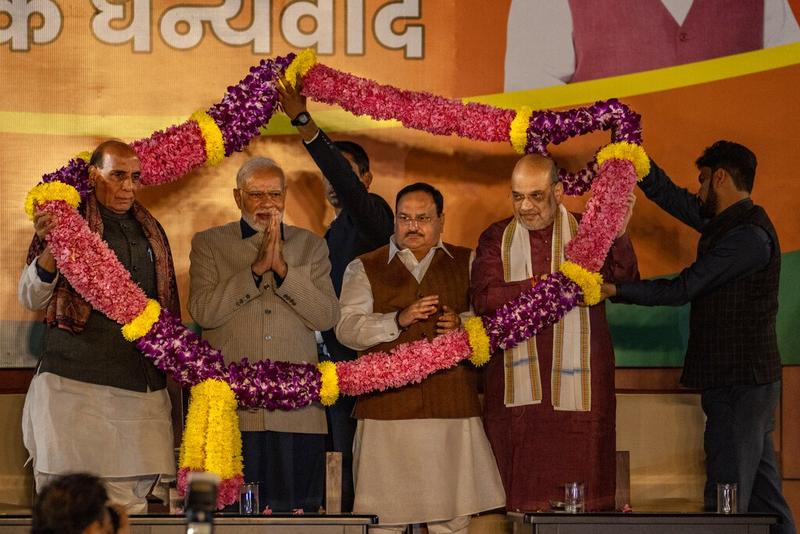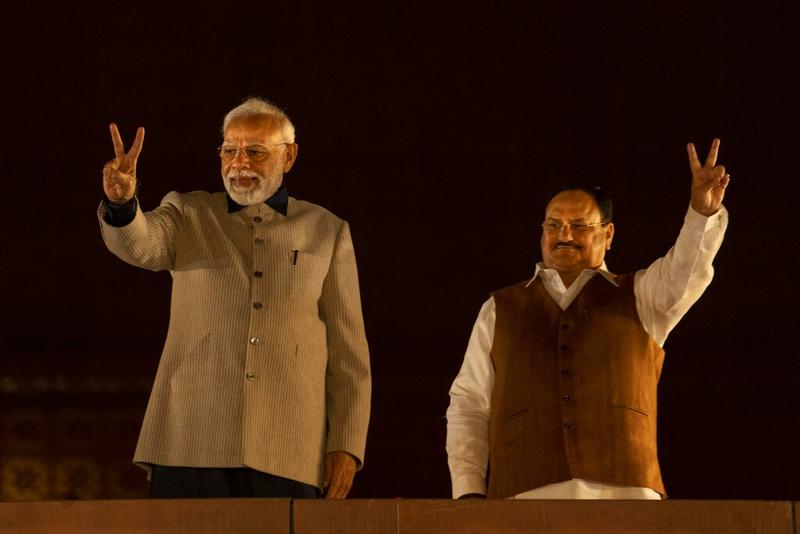 Indian Prime Minister Narendra Modi (center left) Bharatiya Janata Party (BJP) party President J.P. Nadda (centre right) Defence Minister Rajnath Singh (left) and Home Minister Amit Shah (right) pose with a giant floral garland at the party headquarters in New Delhi, India on Dec 8, 2022. (ALTAF QADRI / AP)
Indian Prime Minister Narendra Modi (center left) Bharatiya Janata Party (BJP) party President J.P. Nadda (centre right) Defence Minister Rajnath Singh (left) and Home Minister Amit Shah (right) pose with a giant floral garland at the party headquarters in New Delhi, India on Dec 8, 2022. (ALTAF QADRI / AP)
Prime Minister Narendra Modi’s Bharatiya Janata Party, or BJP, is all set to form government for the seventh consecutive term in western Indian state of Gujarat after scoring a resounding victory in the local election, which analysts see as a significant boost for the ruling party and an indication of its continued popularity ahead of a national election scheduled for 2024.
BJP has been in power in Gujarat since 1995 and has won seven consecutive electoral contests, but the latest election results unveiled on Dec 8 represented the party’s biggest-ever win in the state.
The scale of victory has surprised everybody. It is mainly because of the split of the opposition votes between the INC (Indian National Congress) and AAP (Aam Aadmi Party) which helped BJP to secure such as landslide, said Amit Rajendra Dholakia, a professor at the political science department of The Maharaja Sayajirao University of Baroda, in Gujarat
According to India’s Election Commission, BJP has won 156 out of the 182 seats in the Gujarat legislature, securing more than 80 percent seats, the biggest electoral success by any party in the state’s history. The main opposition party, the Indian National Congress, or INC, once India’s dominant political force, has won just 17 seats while a new group, the Aam Aadmi Party, or AAP, which governs Delhi and Punjab, has won five seats.
“I am overcome with a lot of emotions seeing the phenomenal election results. People blessed politics of development and at the same time expressed a desire that they want this momentum to continue at a greater pace. I bow to Gujarat’s people power,” Modi tweeted after the election result, thanking the people of Gujarat.
The state’s BJP chief minister, Bhupendra Patel, said of the result: “This is a victory of the unwavering faith of people of Gujarat in BJP’s good governance.”
The scale of victory has surprised everybody. It is mainly because of the split of the opposition votes between the INC and AAP which helped BJP to secure such as landslide, said Amit Rajendra Dholakia, a professor at the political science department of The Maharaja Sayajirao University of Baroda, in Gujarat.
ALSO READ: Modi's party set for landslide election win in India's Gujarat state
More importantly, it is an endorsement of the strong leadership quality of Modi, which was the most decisive factor, and overall it is a pro-incumbency vote where the voters have expressed satisfaction with the local and federal governments, Dholakia added.
Another important observation is that the caste factor is no more a decisive factor in Gujarat elections. BJP has won in areas where the INC had dominated for years due to caste dynamics, Dholakia pointed out.
The BJP went all out to win the election. Modi campaigned extensively and held more than 30 rallies to garner support in the run up to the polls, noted Ashis Patel, a final year student of political science from Ahmedabad University, Gujarat.
Amit Shah, the federal home minister who is also from Gujarat and is considered the most influential leader in the state after Modi, had also organized multiple rallies and roadshows during the election campaign, analysts said.
 Indian Prime Minister Narendra Modi (left) and Bharatiya Janata party (BJP) president J.P. Nadda flash victory signs at the party headquarters in New Delhi, India onDec 8, 2022. (AP Photo/Altaf Qadri)
Indian Prime Minister Narendra Modi (left) and Bharatiya Janata party (BJP) president J.P. Nadda flash victory signs at the party headquarters in New Delhi, India onDec 8, 2022. (AP Photo/Altaf Qadri)
Another important observation is that the caste factor is no more a decisive factor in Gujarat elections. BJP has won in areas where the INC had dominated for years due to caste dynamics, Dholakia pointed out
Credit needs to be given to the robust electoral machinery on the ground, mobilized well in advance by the top leadership, said Anupama Roy, a professor at the Centre for Political Science, Jawaharlal Nehru University, New Delhi. Another important reason is fragmentation of opposition votes, especially with the entry of AAP into the fray, said Roy.
Modi is extremely popular in his home state, where he was chief minister for 13 years before becoming the prime minister in 2014, and is still celebrated by many for creating jobs and bringing prosperity, said Lokesh Acharya, a businessman from Ahmedabad, Gujarat’s largest city.
A majority of Hindu voters have also expressed support for Modi's Hindu nationalist agenda, despite criticism that it is causing religious polarization, Acharya said.
ALSO READ: Modi's Gujarat votes, seen as easy test for India's leader
Even major national concerns like inflation, rising fuel prices and government’s failures during the COVID pandemic have had little impact on the overall support for Modi in his home state, said Anil Desai, a diamond trader from Surat, a business hub of Gujarat.
The Gujarat election result has given a significant boost to BJP and has underscored the personal popularity for Modi ahead of India’s 2024 general elections, experts said.
Credit needs to be given to the robust electoral machinery on the ground, mobilized well in advance by the top leadership, said Anupama Roy, a professor at the Centre for Political Science, Jawaharlal Nehru University, New Delhi. Another important reason is fragmentation of opposition votes, especially with the entry of AAP into the fray, said Roy
Yagnesh Dave, spokesman for the BJP in Gujarat, said his party has won even in “Muslim areas” where the Congress party used to win.
The result shows that Muslims are also supporting BJP, said Dave.
While Gujarat was a huge shot in the arm for the BJP, the party, however, suffered a setback in another state election whose results were announced this week.
In the small northern state of Himachal Pradesh, the Congress party wrested power from the BJP, winning 40 out of 68 seats, against the BJP’s 25. Voting took place in Gujarat on Dec 1 and 5 and in Himachal Pradesh on Nov 12, and the ballots were counted on Dec 8.
The voters of Himachal have maintained the tradition of voting out the incumbent government, alternating between BJP and Congress governments every five years.
The Himachal result will offer some consolation for the INC, but the latest state elections represent another major setback for the party overall, given the severe drubbing it received in Gujarat, observers said.
READ MORE: Indian politician from Modi's party detained after prophet remark
INC which governed India for the most of the period since independence and once ruled the majority of Indian states, is facing a test of survival, having been on a downward spiral for the past ten years following the rise of the BJP and various regional parties, said Sanjay Rao Ayde, head of the political science department at St Stephen's College in New Delhi.
Even after the loss of HP, the BJP remains in a formidable position nationally, Ayde said.
The writer is a freelance journalist for China Daily.


